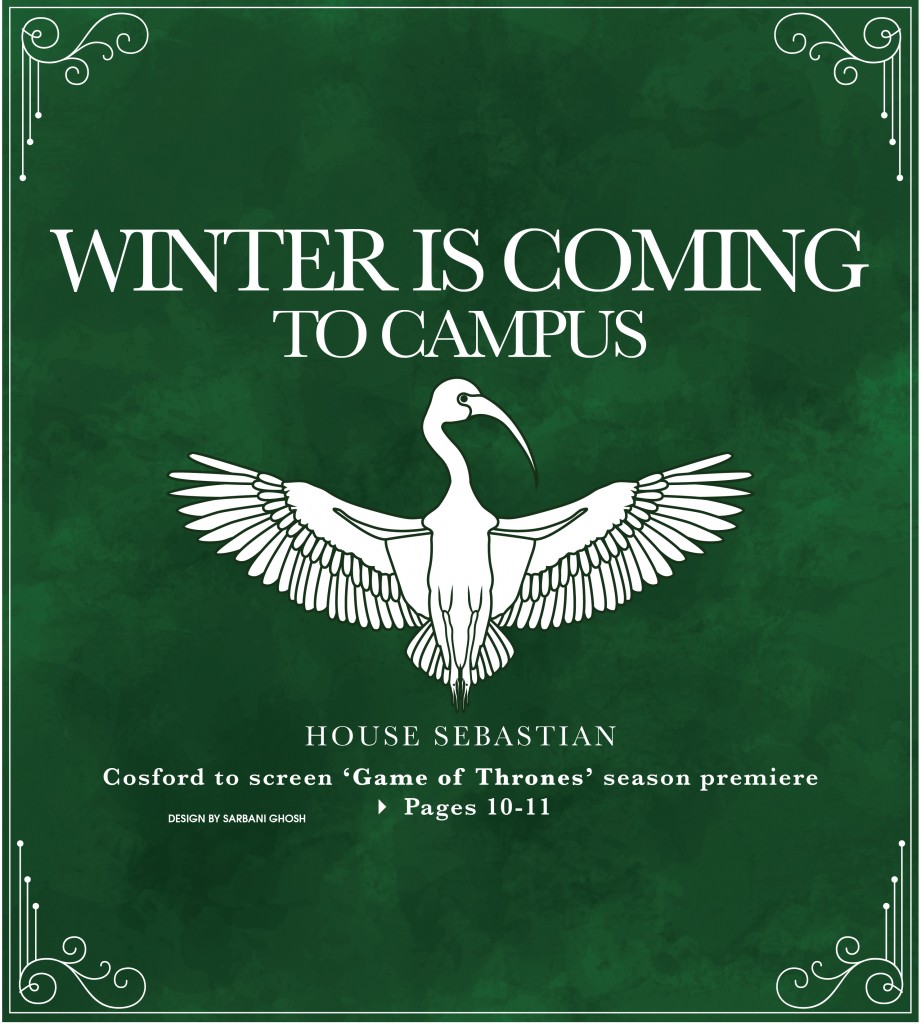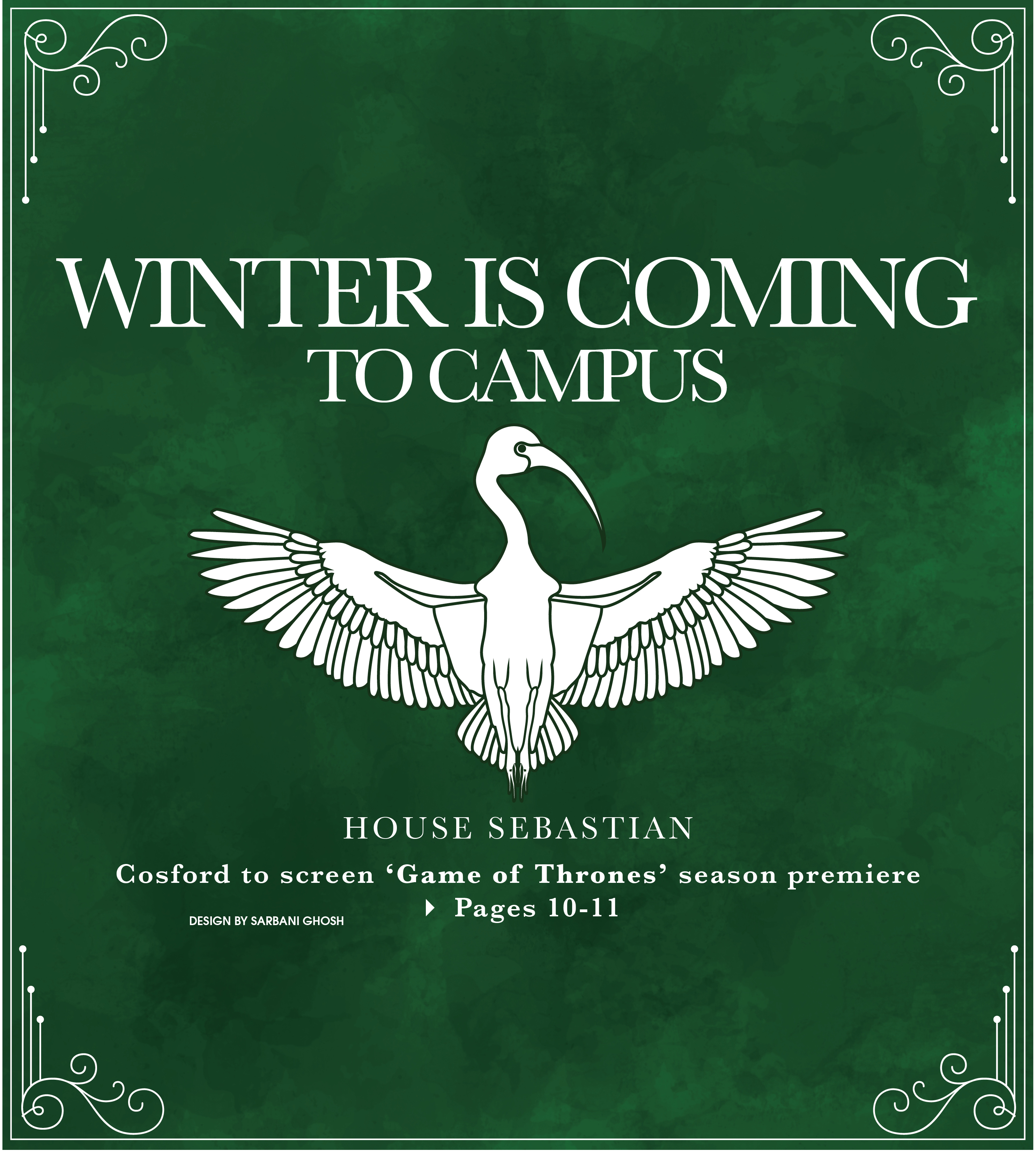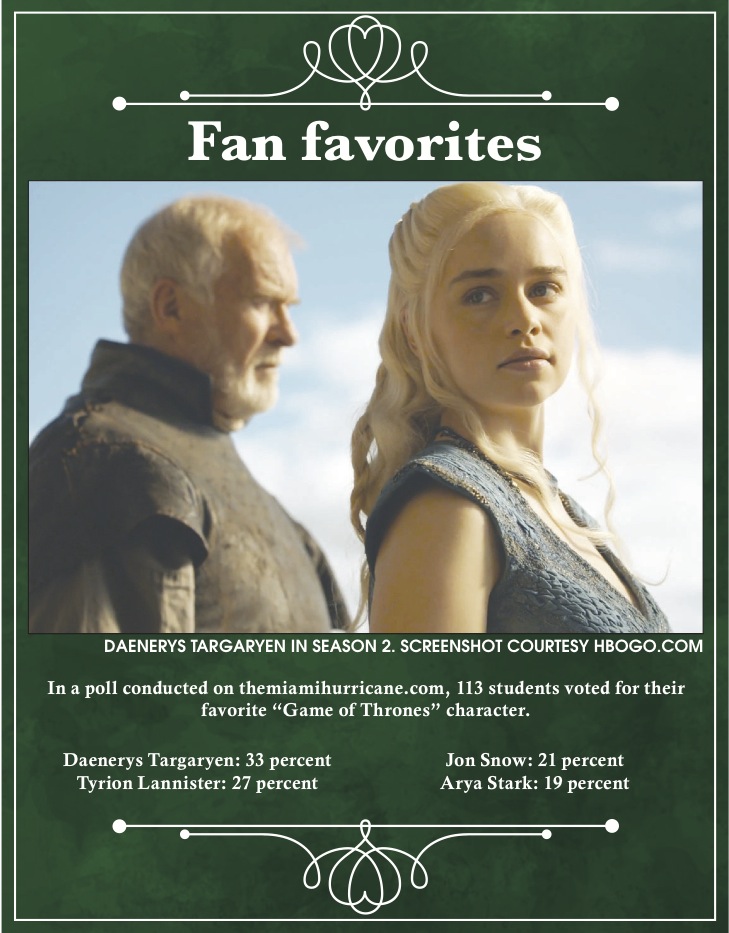
Senior Stephanie Erichsen stared at her brother Joe as they watched the next-to-last episode of HBO’s “Game of Thrones,” season 3. Since she had already read the books that the series is based on, she anticipated her brother’s shocked reaction to the story’s most heart-wrenching and violent moment: the Red Wedding.
“I kept telling him not to look away,” she recalled. “He didn’t once it started.”
The Red Wedding trended on Twitter and led the conversations at many water coolers the next day. Beloved characters that had been developed for three seasons were murdered after a supposedly happy occasion – hence why it’s called the Red Wedding.
This further catapulted the fantasy series to a pop-culture fixation akin to “Harry Potter” and “Lord of the Rings.” The television show is adapted from George R. R. Martin’s popular series of books “A Song of Ice and Fire.” The story takes place in a fictional universe where several kingdoms wage real and political wars against one another all for control of the Iron Throne where the king rules.
The story takes place in a fictional universe where several kingdoms wage real and political wars against one another all for control of the Iron Throne, where the king rules.
Although the show’s fifth season does not premiere until April 12, the University of Miami will be the first site to host a pre-screening for next season’s first episode. HBO College, a marketing and distribution branch that promotes HBO services on campuses across the nation, is promoting the series with pre-screenings in 19 others schools, including the University of Washington in Seattle, Tulane University in New Orleans and the University of South Florida in Tampa, Fla.
Since the show’s premiere in 2011, “Game of Thrones” has appealed to fans of fantasy genre stories, as well as a broader audience. In fact, last season averaged about 19.1 million viewers per episode, according to Joe Bahr, vice president for digital network distribution at HBO.
The story’s wide appeal and interesting relationship to Martin’s source material keeps fans like Erichsen coming back for more.
In this next season, the show will veer more away from Martin’s books – but don’t worry, because Martin, who has written some past episodes, works closely with showrunners Dan Weiss and David Benioff. Some characters still alive in the books will die in Season 5, according to Entertainment Weekly’s recent cover story on the hit series.
Fantasy Fandom
Fans like Erichsen enjoy revisiting the fantastical world that is often full of undesired surprises, like a major character’s death. She is watching “Game of Thrones” for the fourth time and has read the more than 800-page books once.
The extent of her love for the series is evident from her jersey, purchased online, supporting Winterfell; the hub of House Stark, or the rulers of the North in the land of Westeros.
“The North should win something at some point,” she said, referencing how many of the Starks have died over the course of the story.
Erichsen got hooked on “Game of Thrones” from its first season. After watching the first few episodes, she read the books and knew the plot’s general direction by the premiere of Season 2.
Erichsen also hosts small weekly watch parties at her house when each new season airs. About 12 people get together for an intense viewing in which no one is allowed to talk.
“It definitely heightens the suspense that Martin is good at building,” Erichsen said. “When you have a room full of people with hunched shoulders and tightly grasped palms, you know something’s going to happen.”
Erichsen naturally gravitated to Martin’s fantasy story. The creative writing major is an avid fan of popular fantasy stories such as “Harry Potter” and “Lord of the Rings.” She has watched the “Lord of the Rings” films more than 50 times and usually experiences the trilogy in one sitting.
“Because how else are you going to watch it?” she said.
Fellow “Lord of the Rings” fan, junior Andrea Brook, initially thought “Game of Thrones” was going to be along the same lines. A family friend of hers recommended Martin’s books just before the first season aired on HBO.
Brook soon discovered that Martin has set himself apart in this genre.
“‘Game of Thrones’ is extremely raw. It taps into raw human emotion. It taps into sexuality. It taps into violence,” said Brook, who has seen the show twice and read the books once. “Even though there are a lot of magical, fictional elements that are not true to real life, it exhibits a great aspect of human nature.”
Martin Mania
Alberto Cairo, a professor in the School of Communication, agrees with Brook. The appeal of Martin’s story is that his characters are not just good or evil, but have a human side to them.
“But what Martin does really, really well is that even in the context of a fantasy novel, he creates characters you can love, or you can love to hate, or you can hate to love,” Cairo said.
Cairo was a fan of Martin’s work even before “Game of Thrones.” Martin was a well-known science-fiction writer before he became a screenwriter for Hollywood, and later wrote the series that would make him a household name.
When the books were not as popular in the early 2000s – the first edition, “A Game of Thrones,” was published in 1996 – Martin’s publisher in Spain, and a friend of Cairo’s, offered Cairo the opportunity to write the prologue for the third book, “A Storm of Swords.”
Cairo says it was not unusual for people familiar with science fiction in Spain to write prologues. “A Storm of Swords” also happens to be his favorite.
Aside from its more realistic characters, “Game of Thrones” is different than other fantasy novels because it draws upon a tradition of historical fiction, Cairo said.
“What [Martin] does is … basically write a historical novel in a fantasy setting,” Cairo added.
Erichsen, who has taken courses in Viking and Celtic literature, says these influences are present throughout “Game of Thrones.”
“If you take away all of the supernatural, the dragons, the White Walkers [vampire-like creatures who live in an Antarctica-like environment], the magical assassins; you get basic historical fiction,” she said.
Erichsen used the Red Wedding as an example. According to the culture in “Game of Thrones,” once a host has offered guests hospitality, the host respects the guests’ lives and must protect them.
This goes awry for some members of the Stark family who are betrayed and killed as a result.
“The breaking of that pattern, which Martin loves to do, is what really shocks the audience,” Erichsen said.
As for the relationship between the TV show and books, Cairo embraces the choices HBO has made in adapting the series. He believes the collaboration between Martin and showrunners Weiss and Benioff contributed to a “tightened” and “stronger storyline” on the small screen.
A character like Robb Stark, who eventually becomes head of the Stark family, disappears in the second book and returns in the third book.
“In the HBO show, you can’t do that,” Cairo said.

Questions of adaptation interest Lisa Woolfork, an associate professor of English at the University of Virginia. She taught a class on “Game of Thrones” during summer 2014 at UVA.
In an intensive four-week course, Woolfork assigned her students to read the first book and watch the full first two seasons and part of the third season. Each season is 10 episodes long.
Woolfork and her students discussed why certain characters were created just for the TV show and why some scenes from the book were different.
She cited an example from the first book and Season 1. Daenerys Targaryen, who is one of the last living members of House Targaryen, is forced to marry Khal Drogo, the leader of a barbaric, tribe-like society known as the Dothraki.
According to Woolfork, Daenerys gives Drogo sexual consent in the book while the show adapts it as a rape scene. It’s these kinds of discrepancies that drove the conversations in class.
“Once you start to plug in the discrepancies, factor in the fan responses – like all the memes, fan videos, YouTube parodies – there is a huge universe of material to discuss, and that’s pretty fun,” Woolfork said.
Woolfork used the metaphor of train tracks to explain the differences between the books and TV show. She says the two should be viewed as two parallel but separate tracks that will eventually diverge, so they look like “two monorails.”
“At the textual level, it might create a certain type of grounding or verification, and at the same time, the television show has taken on a life of its own,” she added.
In the class, students explored other aspects of the TV show, including lighting, costumes and on-screen language versus the books. Woolfork describes the class as “quite a bit of labor” on the part of students, who took daily quizzes and completed a huge final project.
HBO on Campus
Brook, who majors in public relations and political science, serves as a HBO College campus agent for UM to develop four promotional events per semester based on HBO’s award-winning programming.
“The HBO campus agents are really the voice of HBO on campus,” HBO VP Bohr wrote over email. “They help us speak directly to university students, alerting them to all of the exciting services and programming that HBO has to offer.”
HBO hires two campus agents from schools like UM, where HBO is available in the dorms. Brook is in charge of event planning, and senior Maggie McMahon, the second agent, handles social media.
Even before the job, Brook was no stranger to HBO. She says it has always been her favorite TV provider, so when she was accepted for the position, it was a “dream come true.”
Brook hopes she is invited to the program again for next semester. She has applied for a summer internship at HBO in New York City and plans to enter the entertainment field after college.
McMahon, a public relations major graduating in May, appreciates the experience she’s gained from working with HBO College, too.
“I’ve learned so much since I’ve joined,” she said. “I’ve definitely gotten the same benefits that an internship would have provided.”
Brook and McMahon have been promoting the pre-screening since students caught wind of it on Facebook before spring break. Since the time of publication, 578 people have RSVP’d to attend Thursday’s pre-screening that will take place at Cosford Cinema. The on-campus theater, however, has 240 seats.
Richard Kenney, assistant director of housing services, who first received a call from HBO about the possibility of a pre-screening at UM, urges students not to skip class or camp out for the event.
The line will start at 4 p.m. in the grassy area between Cosford and the Ashe building. The specific location of the line will be posted Monday on Facebook.
Brook and McMahon say the experience will be more than just a pre-screening. The first 100 people are eligible for a special giveaway, and Brook helped plan a pre-show with an emcee and UProv, the on-campus improv comedy group.
The line will be capped as soon the limit is reached. But Kenney says a small amount of overflow will be allowed if there are seats open but will not be guaranteed.








